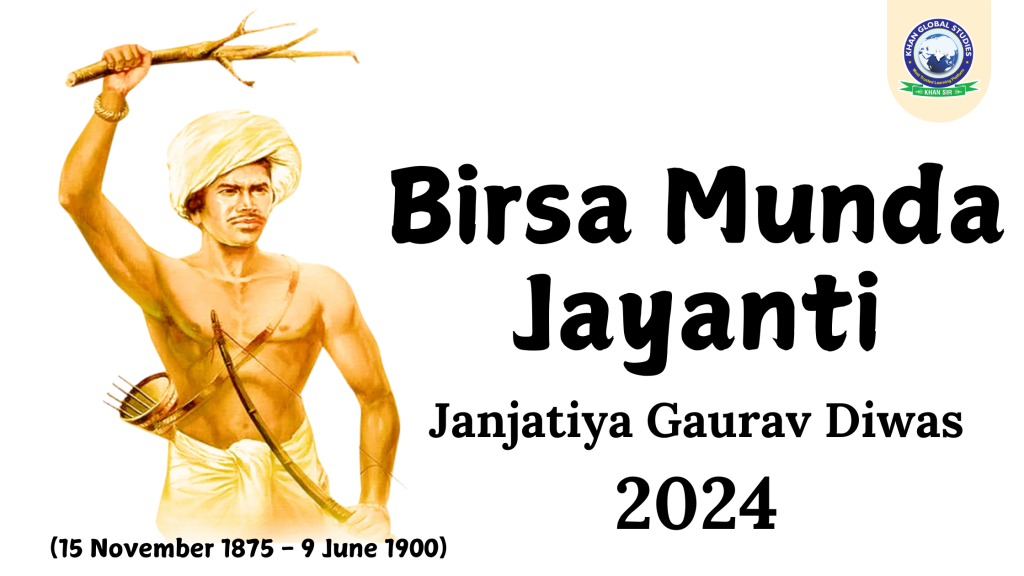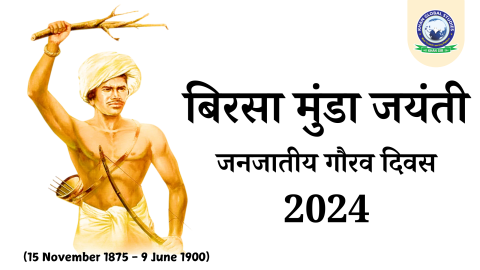Birsa Munda (15 November 1875 to 9 June 1900) was a famous tribal freedom fighter and folk hero of India. He belonged to the Munda tribe and led the religious and social movement of tribals against the British Raj. His movement was mainly concentrated in Khunti, Tamar, Sarwada and Bandgaon areas of Jharkhand. Birsa made his people aware and stood against the unjust land-grabbing policies of British rule.
Early Life
Birsa Munda was born on 15 November 1875 in Ulihatu village of Khunti district of Jharkhand. His family was financially weak and used to work as labourers at different places for a better living. In his childhood, like other tribal children, he used to graze cattle in the fields and wrestle in the village arena. He was also fond of playing the flute.
Birsa completed his early education in Salga under the guidance of Jaipal Nag. Later he became a Christian to join the German Mission School, but soon he saw that tribals were being converted through education. Understanding this, he left school and returned to his traditional tribal religion.
Birsite Movement
Birsa started a new religious movement called “Birsite” with his followers. He called upon his community to return to traditional religion and stand up against the British and Christian missionaries. His movement challenged the British administration and local landlords.
Revolts and Conflicts
In 1899-1900, Birsa led the “Ulgulan” i.e. “Great Revolt”. In this rebellion, his followers fought against the British administration, the church and the local landlords. Birsa gave the slogan “Abua Raj Sete Jana, Maharani Raj Tundu Jana” (Our rule will come, the Queen’s rule will end).
Arrest and Death
Birsa was arrested in February 1900 and lodged in Ranchi jail. He died in jail on 9 June 1900. His movement gradually died down after his death, but in 1908 the British government had to enact the “Chhotanagpur Tenancy Act”, which ensured the protection of tribal lands.
Heritage
Many institutions and sites are named after Birsa Munda in his memory, such as the Birsa Munda Airport in Ranchi, the Birsa Agricultural University, and the Birsa Munda International Hockey Stadium in Rourkela. The Government of India has decided to celebrate his birthday, 15 November, as “Tribal Pride Day”.
Conclusion
Birsa Munda was not only a tribal leader but he also immortalised the role of tribals in the Indian freedom struggle. His life is a symbol of struggle and courage. His movement proved that with strong leadership and organised efforts, any power can be challenged. His teachings and his contribution to the preservation of tribal culture will always be remembered.
FAQs
Question 1: Who was Birsa Munda?
Answer: Birsa Munda was a tribal freedom fighter and Loknayak of India, who organized the tribal society against British rule and led the “Ulgulan” movement.
Question 2: When and where was Birsa Munda born?
Answer: Birsa Munda was born on 15 November 1875 in Ulihatu village of Khunti district of Jharkhand.
Question 3: Which movement was led by Birsa Munda?
Answer: Birsa Munda led the “Ulgulan” or “Great Revolt”, which was against the British rule and their unjust policies.
Question 4: Why is Birsa Munda called “Dharti Aaba”?
Answer: Birsa Munda is called “Dharti Aaba” (Father of Earth) because he made the tribal society aware and led them to their land and rights.
Question 5: When did Birsa Munda die?
Answer: Birsa Munda died on 9 June 1900 in Ranchi Jail.
Question 6: Which institutions are there in honor of Birsa Munda?
Answer: Birsa Munda Airport in Ranchi, Birsa Agricultural University, Birsa Munda International Hockey Stadium in Rourkela and many other institutions have been established in honour of Birsa Munda.




